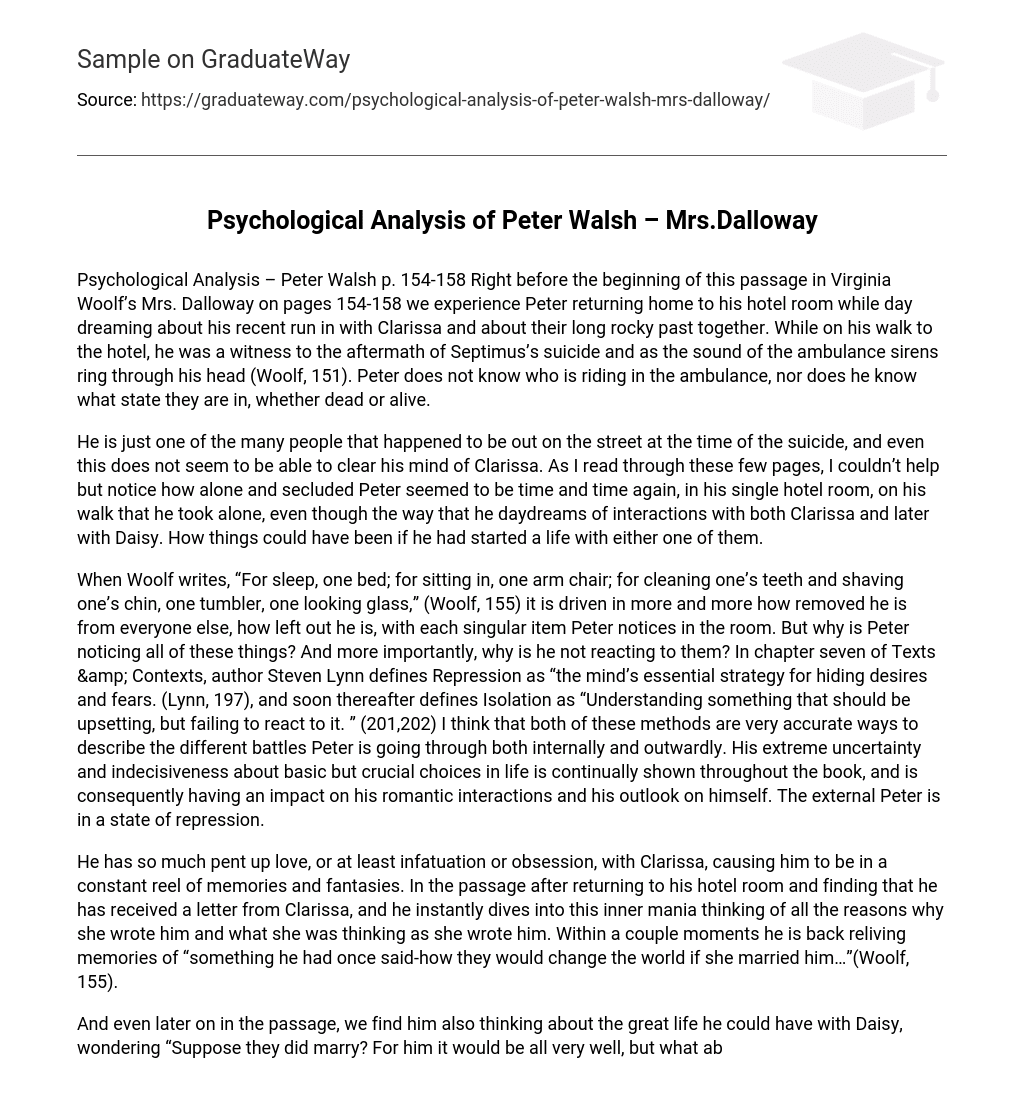Psychological Analysis – Peter Walsh p. 154-158 Right before the beginning of this passage in Virginia Woolf’s Mrs. Dalloway on pages 154-158 we experience Peter returning home to his hotel room while day dreaming about his recent run in with Clarissa and about their long rocky past together. While on his walk to the hotel, he was a witness to the aftermath of Septimus’s suicide and as the sound of the ambulance sirens ring through his head (Woolf, 151). Peter does not know who is riding in the ambulance, nor does he know what state they are in, whether dead or alive.
He is just one of the many people that happened to be out on the street at the time of the suicide, and even this does not seem to be able to clear his mind of Clarissa. As I read through these few pages, I couldn’t help but notice how alone and secluded Peter seemed to be time and time again, in his single hotel room, on his walk that he took alone, even though the way that he daydreams of interactions with both Clarissa and later with Daisy. How things could have been if he had started a life with either one of them.
When Woolf writes, “For sleep, one bed; for sitting in, one arm chair; for cleaning one’s teeth and shaving one’s chin, one tumbler, one looking glass,” (Woolf, 155) it is driven in more and more how removed he is from everyone else, how left out he is, with each singular item Peter notices in the room. But why is Peter noticing all of these things? And more importantly, why is he not reacting to them? In chapter seven of Texts & Contexts, author Steven Lynn defines Repression as “the mind’s essential strategy for hiding desires and fears. (Lynn, 197), and soon thereafter defines Isolation as “Understanding something that should be upsetting, but failing to react to it. ” (201,202) I think that both of these methods are very accurate ways to describe the different battles Peter is going through both internally and outwardly. His extreme uncertainty and indecisiveness about basic but crucial choices in life is continually shown throughout the book, and is consequently having an impact on his romantic interactions and his outlook on himself. The external Peter is in a state of repression.
He has so much pent up love, or at least infatuation or obsession, with Clarissa, causing him to be in a constant reel of memories and fantasies. In the passage after returning to his hotel room and finding that he has received a letter from Clarissa, and he instantly dives into this inner mania thinking of all the reasons why she wrote him and what she was thinking as she wrote him. Within a couple moments he is back reliving memories of “something he had once said-how they would change the world if she married him…”(Woolf, 155).
And even later on in the passage, we find him also thinking about the great life he could have with Daisy, wondering “Suppose they did marry? For him it would be all very well, but what about her? ” (157). But even as his mind swirls with all these fantasies and scenarios, externally he shows nothing. He was a smooth gentleman, attractive to women, who was always reading a book and even had a suave way of knocking ashes out of his pipe (156). He repressed all his desires for Internally, however, Peter was in a state of isolation.
Both of these women are married to different men, and Peter has not had any successful long term monogamous relationship with either of them, yet somehow that does not faze him. Instead of being upset that Daisy is in a relationship and has two children with her husband, he continues to think about the times that they’ve had, about seeing her on the veranda, clad in all white, and hearing her call out his name. He is isolating the women from the knowledge of their marital statues and continues on with his fantasizing of his own future.





